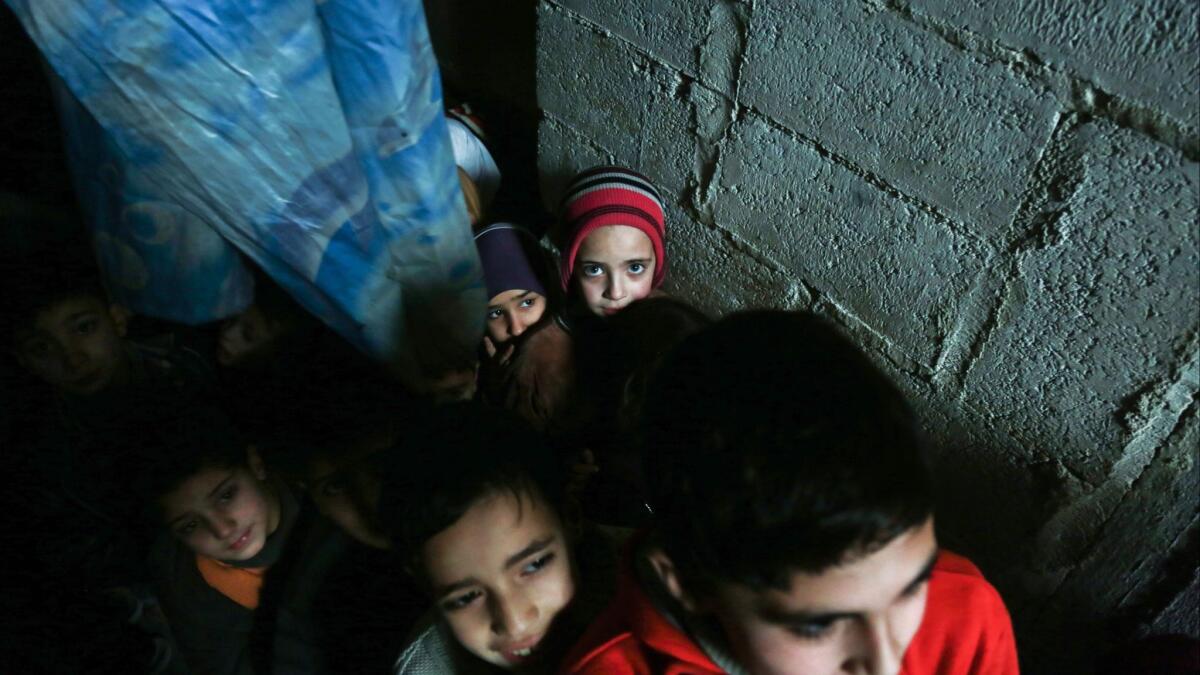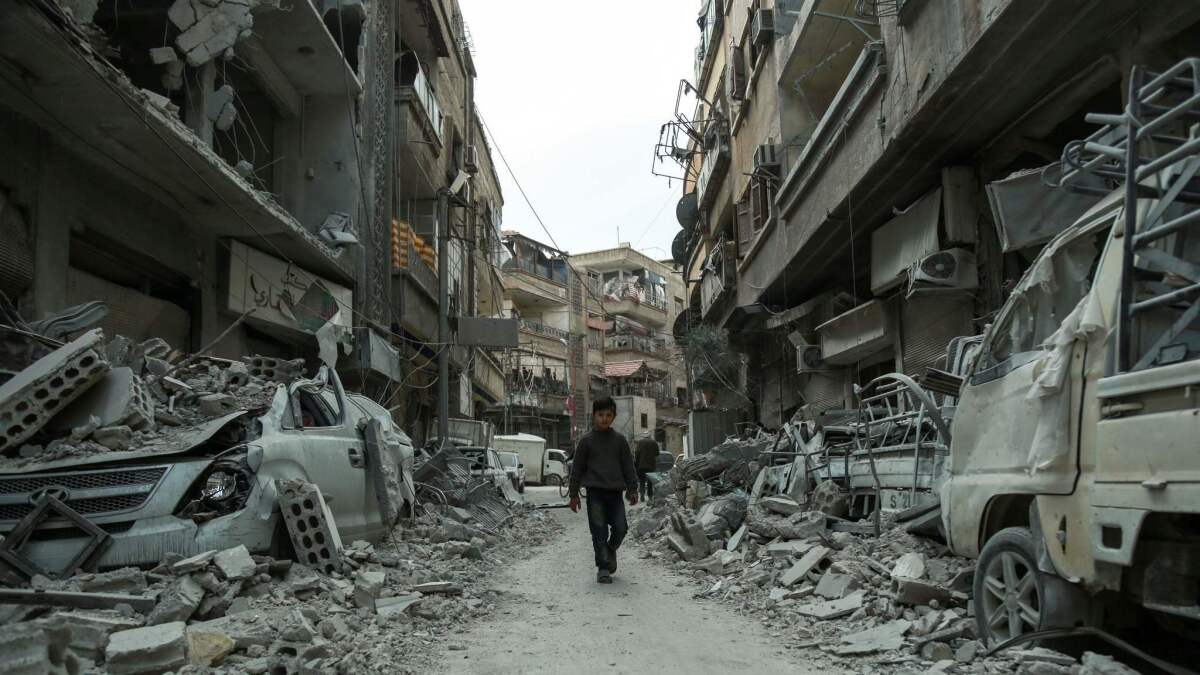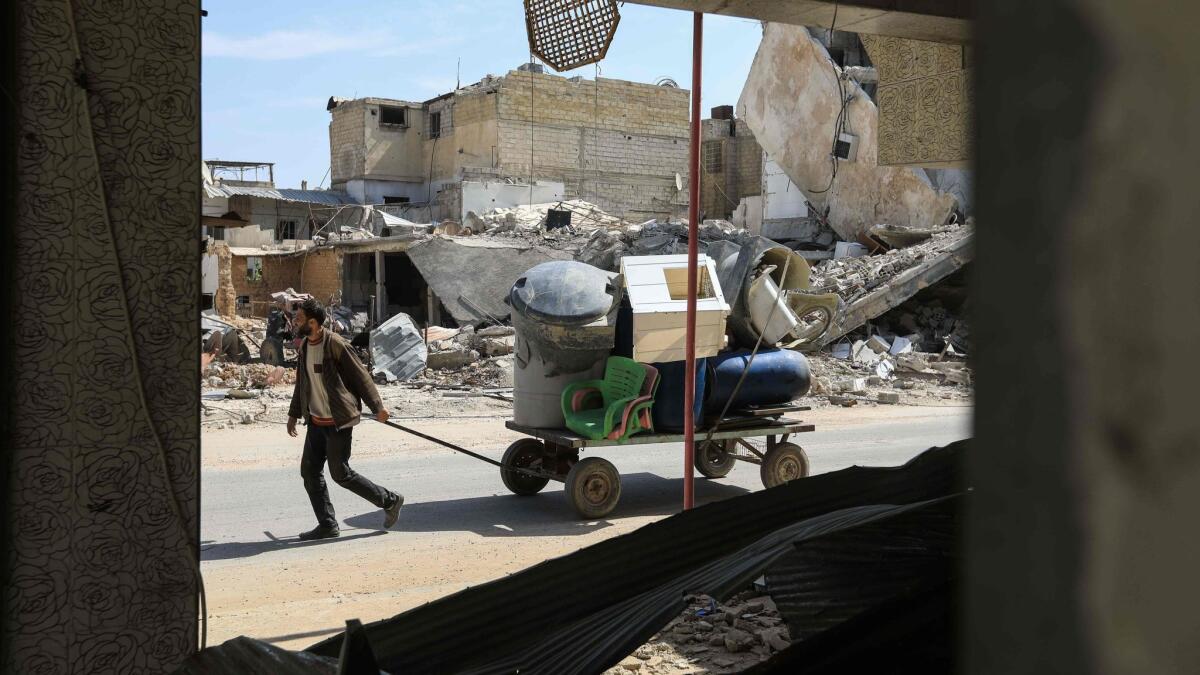Thousands displaced, aid delivery halted as violence consumes Syrian enclave

- Share via
Reporting from Beirut — In a thunderous assault, the Syrian army all but sliced the rebel-held enclave of Ghouta in two Thursday, pushing the death toll to more than 900 since the onslaught began last month and stalling the delivery of food and desperately needed medical supplies.
The fighting created a chaotic and uncertain situation on the ground as world leaders raised concerns regarding the safety of the some 400,000 trapped in the battered territory, just miles from the Syrian capital of Damascus. To many, the fighting was reminiscent of the fierce and final siege in Aleppo when government troops and a Russian-backed airstrike drove rebels from the Syrian city.
Overnight, pro-opposition activists and medical charities reported a devastating uptick in the government’s onslaught, including unconfirmed reports that chlorine has been used in a chemical weapons attack, an assertion the government denied.
“It was absolutely hysterical. Phosphorous, cluster bombs, napalm, machine guns…planes combed the Ghouta all night,” said Hamza Hassan, a 35-year-old doctor with the Syrian American Medical Society, a group that supports and administers health centers in opposition areas.
“Nothing can stop this,” Hassan said via the WhatsApp messaging platform. “This isn’t war, this is burning an area down that has almost 400,000 people.”

On Wednesday, 91 people were killed in Ghouta, according to the Syrian Observatory for Human Rights, a rebel-aligned monitor based in Great Britain that relies on activists in the country. Additional attacks on Thursday raised the death toll to 915 since the beginning of the government’s campaign Feb. 18.
Hassan and others claimed that chemical weapons were deployed in Wednesday’s barrage. Hassan described the attack on Hammouriyah and Saqba -- adjacent towns some four miles east of Damascus’s Old Quarter -- as the “harshest chlorine attack I ever saw.”
“You could smell it all over Hammouriyeh. Fifteen of them were children; water sprays, cortisone, we spared nothing to treat them,” he said.
The Observatory also reported 60 people suffered breathing difficulties after Syrian and Russian airstrikes targeted Saqba and Hammouriyeh on Wednesday.
Damascus has long been accused of using chemical weapons, including a Sarin gas attack on the Ghouta in 2013 estimated to have killed anywhere from 281 to more than a thousand people. The government has repeatedly denied the charge, dismissing it again Thursday as “a charade.”
Pro-opposition activists uploaded footage of what they half-jokingly called a “fireworks display” over Hammouriyeh. Other images depicted members of the Syrian Civil Defense known as the White Helmets, rescue crews working in opposition-held areas, racing to extinguish burning bodies scattered on the ground.
Rami Abdul Rahman, who heads the Observatory, claimed Thursday that government forces used Thermite munitions, incendiary bombs whose use is banned by the Convention on Certain Conventional Weapons. Russia is among the countries that signed that agreement.
Thursday’s violence forced humanitarian groups to postpone the entry of an aid convoy into Duma, the de facto rebel capital in Ghouta.
“We postponed it because there are many developments… The situation is rapidly evolving and it’s difficult for us to go with the convoy,” said Ingy Sedky, the spokeswoman for the International Community of the Red Cross, in a phone conversation Thursday.
Earlier this week, a 46-truck convoy entered the Ghouta and delivered medical supplies as well as food to some 27,500 people. But the shelling, which continued even as aid workers raced to unload their cargo, meant half the supplies remained on the trucks, the U.N.’s coordination office said in a statement Thursday.
The postponement leaves Ghouta’s residents in a state of “constant tension and fear,” said Pawel Krzysiek, a Red Cross spokesman who was aboard the supply convoy.
“These people basically spent the last two weeks underground in makeshift basement shelters,” he said Tuesday. He said as many as three families would crush into a single room to escape the violence, often going without water, basic sanitation and little food.
Thousands have been uprooted in the territory as the constant airstrikes have emptied out entire towns, while so-called humanitarian corridors that are supposed to provide a safety route for people to evacuate were impossible to reach.

Krzysiek said the people in Ghouta he spoke with “don’t really care about politics and affiliations and loyalties. They really want this to stop.”
“They want this to be over…. They just said, ‘Make the [warring sides] reach any agreement to just stop this hell.’”
The escalation in the attack was accompanied by a government thrust into the Ghouta’s eastern edge, with troops less than a mile from meeting their counterparts on the enclave’s western flank, pro-government activists said. Many posted pictures and videos depicting soldiers cheering in what were said to be former rebel-held territories in Ghouta.
But Wael Olwan, a spokesman for the Rahman Corps [Faylaq al Rahman], one of three of the Islamist factions that dominate the Ghouta, denied that the government had divided the territory.
“Very violent battles are still underway,” Olwan said Thursday, adding that the rebels had taken back land from loyalist forces.
“The revolutionaries are still there and pushing the regime back.”
Meanwhile, a number of sources reported negotiations were underway to secure a safe passage for the rebels out of Ghouta; a repeat of a similar deal offered to besieged opposition-held bastions in the past, including Aleppo.
Abdul Rahman, of the Observatory, and Nicholas Zaher, a Damascus-based analyst, said aid deliveries had been postponed because of the negotiations.
Omar Rahmoun, a former rebel turned negotiator for Damascus, confirmed that talks were taking place between Damascus and the opposition.
“There are many sons of the Ghouta in Damascus, local elements, who are opening channels of communication, and I’ve spoken to the factions publicly and secretly. But they will delay until the very last minute, when they lose all hope of any external or political cover,” he said.
“But the decision has been taken by the government that Ghouta will be taken. The matter is clear: When a man finds himself unable to continue then surrender is not shameful.”
Bulos is a special correspondent.
Twitter: @nabihbulos
More to Read
Sign up for Essential California
The most important California stories and recommendations in your inbox every morning.
You may occasionally receive promotional content from the Los Angeles Times.












